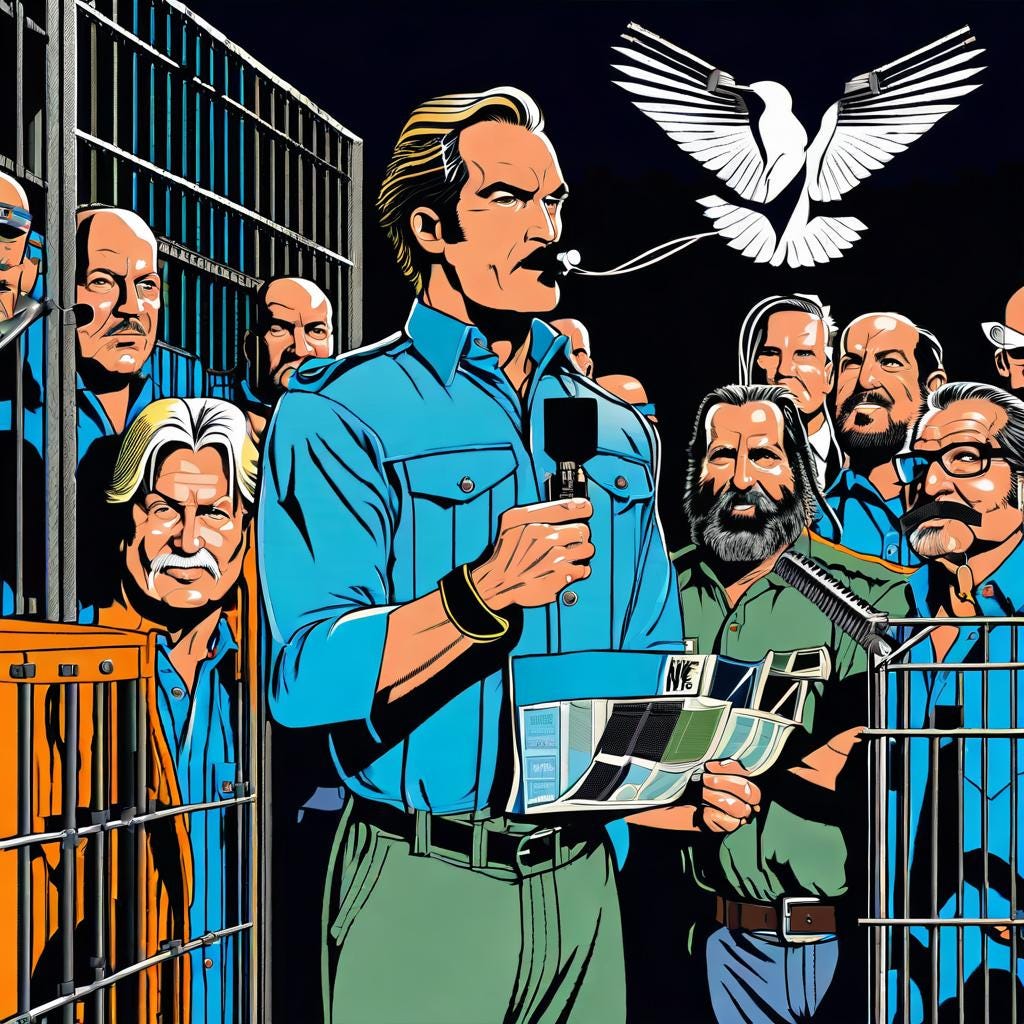Julian Assange walked free on Monday from Belmarsh prison after more than a decade of confinement or imprisonment for exposing government war crimes through WikiLeaks, had agreed to a plea deal with the U.S. allowing him to plead guilty to one felony charge of illegally obtaining and disclosing national security material.
Assange soon landed in the Northern Mariana Islands, a U.S. territory, to formalize the plea agreement—receiving a sentence of time served for the 62 months he has already served in Belmarsh prison in the UK—enabling his immediate release and return as a free man to his native country of Australia for the first time in more than a decade.
Finally, Assange returned home today to a joyous reception, celebrated by his supporters (like us) as a free-speech champion. He landed in Canberra, greeted by his wife, Stella, but did not speak publicly.
Independent media personalities celebrated the news with (surely) unanimous delight: among them Glenn Greenwald, who surely knows a few things about working with classified information, after his work publishing revelations from Edward Snowden about American and British global surveillance programs, and who discussed Assange’s plea deal that evening on System Update.
Greenwald provides context (at ~3:48) on Assange’s prolonged detention, starting with his seeking asylum in the Ecuadorian embassy in London from 2010 to 2018 to avoid extradition to the U.S. While describing the conditions of his confinement in the embassy until, Greenwald tells us (at ~6:14), “the Trump administration under Mike Pompeo succeeded in coercing Ecuador through a combination of threats and bribes [or] promises of benefits to lift that asylum,” leading to his subsequent arrest and imprisonment in the UK’s Belmarsh prison from 2018 until his release on 24 June.
In terms of personal impact, Greenwald highlights (at ~9:13) the toll that Assange’s imprisonment has taken on him and his family, including his separation from his wife and children during his detention. He also discusses (at ~16:48) the broader implications for press freedom and government transparency, positioning Assange as a champion of these causes through his work with WikiLeaks who has now deservedly reunited with his wife, whose tweet Greenwald features (at ~17:36) to confirm his freedom and expressing her gratitude to supporters.
Among the others celebrating, you could find Kim Iversen (who deserves immense credit for her skepticism toward the pandemic regime, though it led to her departure from Rising), who covered Assange’s release that same evening on The Kim Iversen Show with palpable relief.
While Iversen acknowledges (at ~3:42) that Assange’s release is a personal victory, she also expresses her concerns that his guilty plea sets a concerning precedent for journalism and press freedom, arguing that obtaining and disclosing national security material should not be considered a crime for journalists, as exposing government crimes is a crucial aspect of a free press and democracy. Accordingly, she criticizes the deterioration of press freedom in the United States and cites (at ~5:45–6:34) the recent example of The New York Times acting “as the government’s henchmen when they went and hunted down to identify Jack Teixeira, who had disclosed other government documents rather than just publish the documents and let it be as journalists.” She proposes they may have identified Teixeira “in order to prevent a Julian Assange type outcome for the journalists who published those documents […] And so now journalists have turned to acting as government henchmen. And that is the precedent we don’t want, but that is unfortunately the precedent that has been set.”
Nonetheless, Iversen obviously sees his release as a success, and emphasizes (at ~10:21) how pro-Assange activists achieved this victory with clear demands and sustained public pressure in achieving positive outcomes. She argues that this case demonstrates the power of collective voices to influence government decisions, and that it also reveals the importance of having clear, obtainable goals when making demands, citing examples of successful protests with specific demands, such as those calling for universities to divest from Israel. By consistently demanding Assange’s freedom and refusing to let their governments off the hook, the public was able to influence the decision to release him.
Iversen updated her audience the next day with more details about Assange’s court appearance in Saipan, Mariana Islands, before his release from years in confinement.
Here, she examines (at ~2:40) the charges against Julian Assange, specifically the count of conspiracy to obtain and disclose national defense information. Analyzing the implications of these charges for journalism and freedom of the press, Iversen reiterates her concerns about the potential criminalization of publishing classified documents obtained from sources, and reemphasizes (at ~14:30) the importance of news organizations and the public expressing outrage over these charges, as they could set a precedent that would restrict the ability of journalists to report on classified information in the public interest, even if those documents are obtained from sources with legal access.
As you might expect, we here at Radio Free Pizza also wish to broadcast our hearty congratulations to Assange and his family. But since we can’t just be satisfied with a happy ending (and because we’re always looking out for other subjects to cover) we’re also inclined to ask, “What happens next?”
Certainly journalists and press-freedom advocates in the U.S. should continue to fight against the criminalization of journalists obtaining and disclosing national security material as this has proven one of the public’s few useful tools in checking the imperialism of their capitalist republic. Meanwhile, the public should continue to exercise their voices and apply sustained pressure on governments to uphold press freedom and protect whistleblowers and journalists who expose government crimes. In particular, it seems activists would do well to seek a means of challenging the concerning precedent set by Assange’s guilty plea.
Though his decade-long saga of imprisonment and legal battles comes to an end with his release following a plea deal, the implications for press freedom and the role of journalism in exposing government misconduct remain critical considerations going forward. We hope, therefore, that Assange will take himself further out of the crosshairs, and turn his profile from deep investigation to general advocacy—after, of course, he enjoys a long and well-earned rest.






